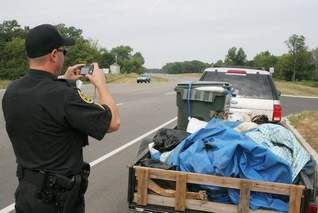

 Sgt. Michael Leutert of the Montgomery County Sheriff's Office takes photos of an SUV he pulled over that was carrying an unsecured load. Below, Sgt. Leutert speaks with two people inside a white Chevrolet pickup truck about securing their load after pulling them over on Dover Road. (Photos by Jamie Dexter/The Leaf-Chronicle)
Sgt. Michael Leutert of the Montgomery County Sheriff's Office takes photos of an SUV he pulled over that was carrying an unsecured load. Below, Sgt. Leutert speaks with two people inside a white Chevrolet pickup truck about securing their load after pulling them over on Dover Road. (Photos by Jamie Dexter/The Leaf-Chronicle)Law says tie litter down
A white pickup with a load of tree limbs and debris flies down Dover Road.With nothing securing the debris, they flutter in the wind, dangerously close to flying from the back of the truck.
Sgt. Michael Leutert, of the Environmental Enforcement Unit of the Montgomery County Sheriff's Office, flips on his lights and follows the truck, pulling it over.
"If tree limbs fall into the middle of the roadway, people might swerve and hit another car, another kid or something and wreck," Leutert said earlier about another vehicle. "That's why we have (the 'tarp law'). ... It needs to be tied down."
The state law Leutert refers to requires anyone carrying material in the back of a pickup or on a trailer — be it limbs, debris, trash or anything else — to secure it "as to reasonably ensure it will not fall or be blown off the vehicle."
This could mean covering it with a tarp if the debris is small, or tying larger pieces down with cables.
With some debris, safety isn't the only concern — some trash can be harmful to the environment or require road crews to clean up the mess.
"I've seen construction debris where someone tore out walls, and it's covered in pink insulation, and that stuff flies off going down the road. How many years do you think it takes for that stuff to decompose into the Earth?" Leutert says. "Basically, it'll have to be picked up."
Leutert added that even with two litter buses, it's amazing how much debris and garbage is on the road, even after the road has been cleaned by workhouse inmates.
"A percentage of this waste comes from people not securing their loads," Leutert says.
Leutert said in the five years he's been enforcing these laws, word has gotten around, and he's seeing more and more people securing their loads, but he says he still has to work to educate people about the laws.
Some don't know about the laws, he says, and some just don't care.
"Some people just don't have a clue," he says. "So I have to be the person that gives them a clue ... ignorance of the law is not an excuse."
If someone who has a load that should be covered and secured is pulled over, that "clue" could end up amounting to around $500 in fines, court costs and community service.
"It could end up being at least $700 for not doing a simple thing to help keep the roadways clean," Leutert says.
For those hauling other loose material in smaller amounts, the material has to be four inches below the the walls of an open bed, according to state law.
Being pulled over in violation of that law can amount to around $201 in fines and court costs.
And if anyone knowingly throws litter, including cigarette butts, onto the road, they can be fined.
Leutert says when he patrols, he checks to make sure people carrying a load have done whatever they can to keep anything from falling into the road.
"You can easily tell after doing this a while who does and who doesn't," Leutert says. "The penalties for not following state law are pretty severe. Tennessee does not take kindly to litter."
While some, including those in the white truck, might drive away with a ticket in hand, fuming about the fines they will be paying, Leutert says it's all for a good reason.
Says Leutert: "The sheriff (Norman Lewis) and Pete Reed, director of the Bi-County, and myself all have a common goal — to keep Montgomery County cleaner and, in return, safer by continuing efforts in the Environmental Enforcement side of the law enforcement house."
Jamie Dexter covers crime and entertainment and he can be reached at 245-0216 or jamiedexter@theleafchronicle.com.

No comments:
Post a Comment